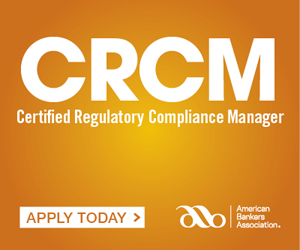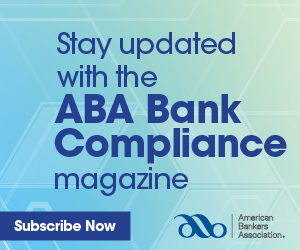| Past Issues | Subscribe | ABA Bank Compliance magazine | ABA Banking Journal | ||||
 |
||||
May 17, 2019 |
||||
|
First Financial Bank takes elder fraud seriously. The $7.8 billion bank with locations across Texas has stopped $7.5 million in elder fraud, including $2.3 million in 2018 alone.
The rapid growth is attributable largely to nonbanks. Should this group of loans start underperforming, the risk to the banking sector is relatively low.
The act of ghosting is characterized by an abrupt, complete and unexplained cutoff of all contact—and it’s an increasingly common byproduct of the hiring process. With low unemployment rates and high competition for talent, it’s a seller’s market out there. Especially for the technical and analytical skills most critical to banks.
In a comment letter to the Consumer Financial Protection Bureau this week, ABA urged the bureau to revise its payday rule to exclude traditional consumer loans offered by banks, such as "bridge" loans, demand lines of credit and loans secured by securities.
The House Financial Services Committee has voted to advance H.R. 2514—an ABA-backed bill introduced by Rep. Emanuel Cleaver (D-Mo.) that would modernize the Bank Secrecy Act/anti-money laundering framework. ABA President and CEO Rob Nichols welcomed the move. (ABA Banking Journal)
The Financial Crimes Enforcement Network has reissued its geographic targeting orders temporarily requiring U.S. title insurance companies in specified areas to identify the individuals behind companies used to conduct high-end, all-cash real estate transactions.
The federal banking agencies plan to reintroduce the examination manual for anti-money laundering/Bank Secrecy Act compliance later this year, Comptroller of the Currency Joseph Otting told the Senate Banking Committee today.
The Consumer Financial Protection Bureau has issued a notice detailing how it will periodically review regulations as required by the Regulatory Flexibility Act, which requires agencies to conduct decennial reviews of certain rules and consider their effects on small businesses.
May 21, 2019 May 29, 2019 June 3, 2019 June 9-12, 2019 October 5-11, 2019 October 7-11, 2019 |
||||



